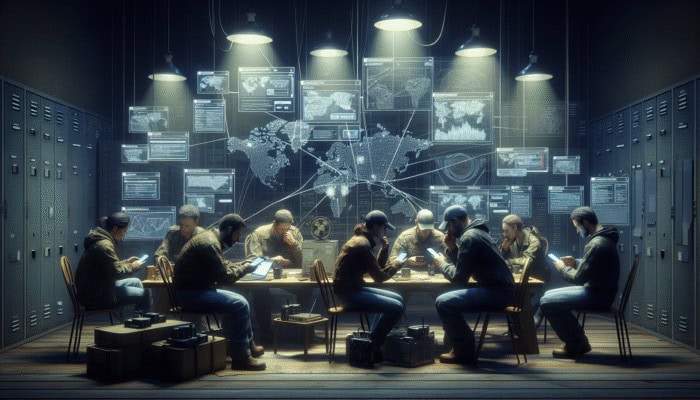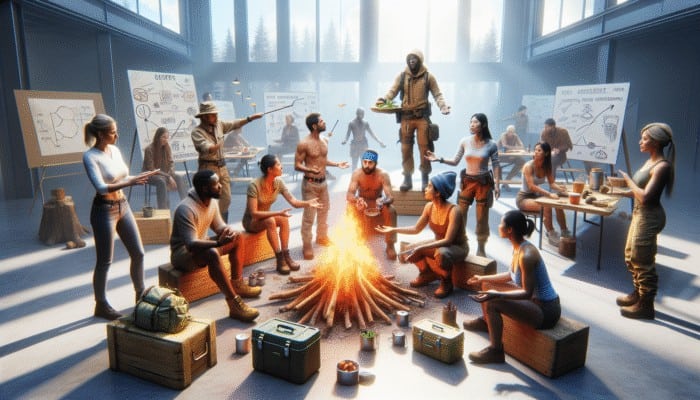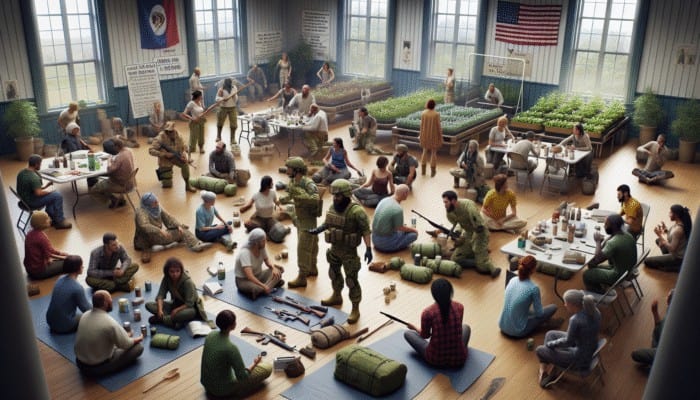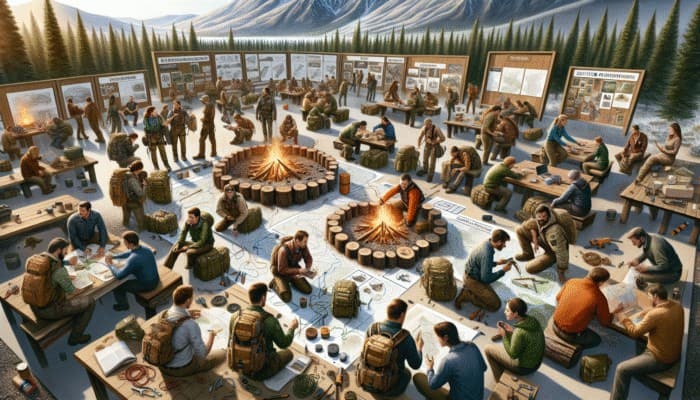Establishing a Dynamic Prepper Network for Collaborative Success
Prepper Collaboration Ideas: Creating a well-structured prepper network is essential for survival enthusiasts aiming to boost their readiness and resilience in challenging situations. This network acts as a vital foundation for mutual support, the sharing of resources, and the enhancement of survival skills. By forming connections with like-minded individuals and organisations, preppers can cultivate a community that strengthens everyone's preparedness efforts. Below are several actionable strategies to establish a vibrant and productive prepper network that ensures everyone's needs are met and their skills are honed.
Setting Up Reliable Communication Channels

Robust communication is the cornerstone of any thriving prepper network, facilitating the exchange of crucial information, updates, and resources among members. Secure and dependable communication platforms can range from encrypted messaging applications to private discussion forums, tailored to the desired level of privacy and security. Tools like Signal or WhatsApp offer encrypted options for exchanging sensitive information, ensuring that all discussions remain confidential and secure.
Creating a dedicated website or forum for your prepper group can also foster structured discussions, resource sharing, and event organisation. This centralised hub simplifies communication, making it easy for members to access important information and stay informed about community activities. Regular updates regarding preparedness strategies, upcoming meetings, and workshops can cultivate community and encourage active participation among members, enhancing everyone’s readiness.
Moreover, integrating social media platforms can significantly boost visibility and engagement within the group. Platforms like Facebook groups or Instagram accounts can help reach a wider audience, allowing the exchange of ideas and experiences from preppers across the globe. Encouraging group interaction through polls or discussion threads can promote collaboration and strengthen community bonds, creating a more interconnected and supportive environment.
Scheduling Regular Community Meetings
Regular community meetings are pivotal for effective collaboration within a prepper network. These gatherings provide opportunities for face-to-face interactions, fostering strong relationships and building trust among members. Begin by designing meetings that centre around specific topics, such as local emergency plans, resource sharing, or skill-building sessions that enhance the group's knowledge base.
Inviting guest speakers specializing in relevant areas, such as survival tactics, first aid, or sustainable practices, can greatly enrich these meetings. Adding expert insights encourages attendees to engage actively in discussions, benefiting from the wealth of knowledge shared. Furthermore, allocating time for member presentations allows individuals to showcase their unique skills, experiences, or resources, fostering a culture of learning and collaboration within the community.
The venues for these meetings can vary widely, from community centres to outdoor settings, inspiring creativity and flexibility in planning. Conducting meetings outdoors can provide a unique backdrop for survival workshops or training exercises, integrating practical applications of the topics discussed. Additionally, leveraging technology to host virtual meetings accommodates members unable to attend in person, ensuring inclusiveness and participation from all network corners.
Utilising Online Platforms for Enhanced Connectivity
In today's interconnected world, leveraging online platforms for connection and collaboration among preppers is essential. Websites, forums, and social media groups offer invaluable opportunities for knowledge exchange among individuals from diverse backgrounds and regions. Platforms like Reddit and specialised prepper websites enable users to engage in discussions, share tips, and forge connections with fellow enthusiasts, expanding their preparedness knowledge.
Creating a dedicated online forum can facilitate deeper discussions tailored to your group’s interests and needs. This space can serve as a resource library where members can upload guides, articles, and tutorials, enriching the collective knowledge. A well-organised forum can host topics ranging from local disaster preparedness to advanced survival techniques, encouraging members to contribute actively and engage with the material.
Moreover, online platforms can also be employed to initiate collaborative projects. For instance, preppers can connect with others to source unique resources, such as heirloom seeds or specialty survival gear. Group purchases can lower costs and ensure that all members have access to quality items that may not be available locally. Building a network of global contacts can lead to innovative solutions and strategies that significantly enhance a group's preparedness.
Conducting Engaging Skill-Sharing Workshops

Skill-sharing workshops represent an excellent opportunity to elevate the capabilities of a prepper community while fostering collaboration. These workshops serve as platforms for members to teach and learn essential survival skills, ranging from basic first aid to advanced wilderness survival techniques. Organising these events can be straightforward, involving the establishment of a schedule and inviting members to volunteer as instructors based on their areas of expertise.
One effective approach is to hold themed workshops, dedicating sessions to food preservation techniques such as canning or dehydrating. Participants can benefit from hands-on experiences and take home practical skills that enhance their self-reliance. Encouraging members to share their experiences and challenges during these workshops also promotes a sense of camaraderie and collective problem-solving, enriching the community’s knowledge base.
Furthermore, incorporating a feedback loop can enhance these workshops. Gathering insights from participants after each event allows organisers to refine future sessions, focusing on topics of interest and adjusting for varying skill levels. Online platforms can also host virtual workshops, making expertise more accessible and enabling individuals from different regions to participate and learn from one another, further strengthening the community's skill set.
Maximising Resource and Skill Sharing for Overall Preparedness
The heart of effective prepper collaboration lies in sharing resources and skills. By pooling resources and fostering skill development, communities can significantly bolster their overall preparedness and ensure that every member has access to the tools and knowledge they require. This collaborative spirit enhances individual readiness and strengthens the community as a whole, creating a more resilient network.
Building Comprehensive Resource Pools
Establishing resource pools is fundamental for fostering collaboration within a prepper network. This approach enables members to share essential supplies, equipment, and knowledge, ensuring everyone has access to critical resources without the financial burden of individual ownership. Creating a communal inventory of tools, food supplies, and survival gear alleviates financial strain on individual preppers while enhancing overall preparedness.
One effective method is to designate a central location, such as a community shed or shared storage space, where members can deposit and maintain resources. This centralised approach promotes accountability and encourages active contributions from all members. Regular inventory checks can ensure that resources remain in good condition and are readily available when needed, enhancing the community's resilience.
Furthermore, implementing a check-out system enables members to borrow equipment or supplies as required, ensuring that no one is left without crucial items during emergencies. Documenting the borrowing process can enhance transparency and trust within the community, creating a network built on mutual support. Additionally, hosting periodic resource-sharing events—where members can donate or trade items—can stimulate engagement and foster an environment of generosity and collaboration, reinforcing community bonds.
Facilitating Skill-Sharing Workshops for Collective Growth

As previously mentioned, skill-sharing workshops are an invaluable aspect of collaboration among preppers. These workshops equip individuals with practical skills and create opportunities for personal connection and community building. Organising sessions can revolve around specific themes, such as self-defence, gardening, or food preservation, allowing members to teach and learn from one another.
To maximise participation, consider the diverse skill sets within your community. Some members may have expertise in cooking with limited resources, while others might excel in wilderness navigation. By creating a balanced workshop schedule that caters to various interests and skill levels, you encourage greater involvement from all community members, fostering a sense of unity and shared purpose.
Creating a mentorship aspect within these workshops can also be beneficial. Experienced preppers can take on mentorship roles, guiding newcomers through essential skills and sharing insights from their experiences. This dynamic fosters a supportive environment where members feel comfortable asking questions and seeking guidance, enriching the community’s collective knowledge base and enhancing everyone's preparedness.
Moreover, leveraging technology can extend the reach of these workshops. Online platforms allow for live-streamed sessions or recorded tutorials that members can access at their convenience. This flexibility accommodates those unable to attend in person, ensuring that knowledge sharing continues outside of scheduled meetings, thereby enhancing the community's resilience.
Establishing Efficient Trade Systems for Resource Sharing
Creating trade systems within a prepper community can significantly enhance resource availability and strengthen member relationships. These systems encourage the exchange of goods and services, promoting self-sufficiency while fostering a culture of collaboration. Establishing a barter system allows preppers to trade surplus items or services, reducing their dependency on traditional markets and enhancing community resilience.
To implement an effective trade system, start by identifying the skills and resources each member can offer. These could range from gardening produce and homemade goods to specialised skills like carpentry or emergency medical training. Maintaining a list of available items or services—perhaps through an online platform—can facilitate easier exchanges and promote active participation within the community.
Trade events can further stimulate this system. Organising swap meets or community fairs allows members to showcase what they offer while engaging in face-to-face interactions. Such events can serve as informal gatherings, enhancing community spirit while providing practical benefits to members. Additionally, establishing guidelines or agreements can ensure fairness and transparency in trades, preventing misunderstandings and fostering trust among members.
Implementing Effective Mentorship Programs
Mentorship programs represent a powerful way to nurture new preppers while leveraging the knowledge and experience of seasoned individuals. Such programs create a structured approach to skill development, offering guidance and support to those seeking to enhance their preparedness. Pairing newcomers with experienced members fosters a sense of belonging and accelerates learning, enriching the entire community.
To design a mentorship program, start by identifying potential mentors within your community. Those with extensive experience in survival skills, emergency preparedness, or sustainable living can provide invaluable insights to newcomers. Establishing clear expectations for mentors and mentees can help streamline the process, ensuring each participant understands their roles within the learning journey.
Regular check-ins between mentors and mentees can foster ongoing communication and support. Encourage mentors to share their experiences, challenges, and lessons learned, providing a realistic perspective on preparedness. Additionally, organising group activities where mentors and mentees can collaborate on projects can enhance the learning experience and strengthen community ties, creating a more interconnected and supportive environment.
Promoting success stories within the mentorship program can inspire others to participate, creating a ripple effect that enriches the entire prepper network. Celebrating achievements and growth motivates individuals and reinforces the importance of collaboration and knowledge sharing within the community, ultimately enhancing everyone's preparedness.
Collaborative Planning and Training for Enhanced Preparedness
Collaborative planning and training are essential components of a successful prepper network. By working together to develop unified plans and engage in joint training exercises, communities can significantly improve their overall preparedness and ensure effective responses during emergencies. This collective effort strengthens individual capabilities and reinforces bonds within the community, creating a more resilient network.
Conducting Comprehensive Joint Drills
Joint drills are a practical method for preppers to practice emergency response scenarios and improve their readiness for various situations. Depending on the specific challenges faced by the community, these drills can range from natural disaster preparedness exercises to urban evacuation simulations. Members can learn how to coordinate effectively, communicate clearly, and execute their plans under pressure by participating in these exercises together.
An effective approach is to design scenarios that reflect real-world emergencies relevant to your region. For instance, communities in coastal areas might focus on hurricane evacuation drills, while those in earthquake-prone regions could simulate building safety protocols. Encouraging involvement from all members—including families—creates a comprehensive understanding of roles and responsibilities during emergencies, enhancing collective preparedness.
After each drill, it is critical to conduct a debriefing session. This allows participants to share their experiences, discuss challenges faced, and identify areas for improvement. By fostering an environment of constructive feedback, communities can refine their emergency plans and enhance their preparedness strategies. Additionally, documenting these drills provides valuable resources for future training, ensuring continuity and growth within the community.
Developing Unified Emergency Plans
Collaborative planning is crucial for ensuring that all members of a prepper community are aligned during emergencies. Developing unified plans requires input from various members, incorporating their unique perspectives, skills, and resources. This collective effort can lead to comprehensive strategies that cater to the community's diverse needs, ultimately enhancing overall preparedness.
Begin by outlining the potential risks and emergency scenarios relevant to your area. Involving community members in this assessment can help identify vulnerabilities and prioritise preparations. From there, work together to create a cohesive plan that addresses evacuation routes, communication strategies, and resource allocation, ensuring that all members are well-informed and prepared.
Regularly revisiting and updating these plans is essential, as circumstances can change rapidly. Establishing a schedule for reviews ensures that the community remains adaptive and responsive to evolving threats. Engaging in discussions about potential improvements during meetings or workshops can encourage ongoing collaboration, maintain a culture of preparedness and vigilance among members, and reinforce their collective resilience.
Furthermore, sharing these plans with local emergency services can enhance emergency coordination. Building relationships with local authorities can also provide valuable insights into community resources and support systems, ensuring that all members are well-informed and prepared for any situation.
Sharing Valuable Training Resources
Compiling and sharing training resources fosters a culture of continuous learning within a prepper community. By creating a repository of valuable materials, such as instructional videos, articles, and guides, members can access a wealth of information at their convenience. This resource-sharing approach promotes self-directed learning and encourages individuals to explore areas of interest or necessity, ultimately enhancing their preparedness.
Additionally, organising training sessions that focus on specific skills can enhance the group's collective competence. Topics might include first aid, wilderness survival, or emergency food procurement. By inviting experts to lead these sessions, members can benefit from professional insights while also creating opportunities for networking and collaboration, strengthening the community as a whole.
Utilising technology to facilitate access to training resources can further enhance participation. Creating online libraries or utilising platforms like Google Drive can ensure that all members have easy access to valuable materials. Encouraging members to contribute their resources can enrich the repository, fostering a sense of ownership and commitment to community learning, which is vital for resilience.
Promoting ongoing education through continuous engagement can keep the community informed about the latest techniques and trends in preparedness. Establishing an environment that values knowledge sharing will inspire members to seek new skills and remain proactive in their preparedness efforts, enhancing their overall capability and readiness.
Organising Collaborative Workshops for Skill Enhancement
Collaborative workshops create dynamic learning environments where preppers can collaborate to enhance their skills and knowledge. These workshops can cover various topics, from practical skills like bushcraft and trapping to theoretical discussions on sustainability and resilience. Engaging experts or experienced practitioners to lead these sessions can lend credibility and depth to the learning experience, ensuring members gain valuable insights.
Consider structuring workshops around hands-on activities, enabling participants to practice skills in real-world scenarios. This experiential learning approach can significantly enhance retention and understanding, allowing members to apply what they’ve learned in practical situations confidently. Additionally, incorporating group activities encourages collaboration and problem-solving among participants, further enriching the learning experience and fostering community bonds.
Utilising participant feedback to improve future workshops can create a cycle of continuous development and engagement. Asking attendees to share their thoughts on what worked well and what could be improved can help tailor future sessions to the community's needs. Encouraging members to propose topics or share their expertise can foster a sense of ownership and eagerness to participate in the community’s growth.
Moreover, leveraging online platforms for collaborative workshops can extend their reach beyond geographical limitations. Virtual workshops allow preppers from different regions to learn and share, enhancing global connections and knowledge exchange within the prepper community, ultimately enriching everyone's preparedness.
Establishing Clear Communication Protocols
Clear communication protocols are vital for effective coordination during emergencies and routine planning. Establishing guidelines for how information is shared, who is responsible for communication, and what channels are utilised can enhance the community’s responsiveness and efficiency. This system helps prevent misinformation and confusion during critical moments when clarity is paramount, ensuring all members are on the same page.
Start by identifying key communication points within the community. Designating spokespeople or leaders who can relay information ensures that messages are consistent and accurate. Additionally, utilising multiple communication channels—such as text alerts, email newsletters, and social media updates—can enhance outreach and ensure that all members receive timely information, which is crucial for effective preparedness.
Regularly testing communication protocols through drills or exercises ensures everyone is familiar with the system. This practice can help identify potential gaps or issues, allowing the community to make necessary adjustments before emergencies arise. Reinforcing the importance of communication training will empower members to respond effectively during crises, ultimately enhancing their preparedness.
Moreover, creating a communication hierarchy can streamline information flow, ensuring critical messages promptly reach the right individuals. By maintaining open lines of communication and emphasising the importance of transparency, the community can foster trust and cooperation among members, ultimately enhancing their collective preparedness and resilience.
Implementing Security Measures for Community Safety
Security is a paramount concern for preppers, particularly in times of crisis. Ensuring the safety of community members and their resources is a collaborative effort that requires proactive measures. By implementing comprehensive security strategies, prepper networks can enhance their resilience and readiness for potential threats, ensuring the community remains safe.
Establishing Effective Neighborhood Watch Programs
Neighborhood watch programs can significantly improve security within a prepper community. These initiatives encourage members to be vigilant and proactive in monitoring their surroundings, fostering a sense of collective responsibility for safety. By organising regular meetings, members can discuss security concerns, share observations, and develop strategies to address potential threats together, building a stronger and more secure community.
Training sessions focused on situational awareness and emergency response can empower members to act effectively in times of crisis. Providing guidelines on how to report suspicious activities or coordinate responses can enhance the effectiveness of these programs, ensuring that everyone is aligned in their efforts to safeguard the community and its resources.
Creating dedicated communication channels for neighborhood watch members can facilitate quick information sharing and coordination. Utilizing group messaging apps or dedicated social media groups allows real-time updates and alerts, enabling rapid responses to potential threats. This immediate communication can be crucial during emergencies, where timely action is essential for community safety.
Encouraging collaboration with local law enforcement can further strengthen neighborhood watch efforts. Building relationships with officers can provide valuable insights into security measures and community safety initiatives, enhancing the group's overall preparedness. By fostering a cooperative approach, preppers can create a more secure environment for everyone involved, ensuring the community is well-prepared for any situation.
Coordinating Efficient Emergency Responses
Coordinating emergency responses is vital for ensuring an efficient and effective reaction during crises. By developing comprehensive response plans that involve all community members, preppers can create an organised approach to managing emergencies. This coordination can minimise confusion and maximise resource utilisation, enhancing the community's resilience and preparedness.
Establishing roles and responsibilities for each member during emergencies is essential. By designating specific tasks—such as first aid, resource allocation, or communication management—members can feel empowered to contribute actively during crises. Regular training and drills can reinforce these roles, ensuring that everyone knows their responsibilities and is prepared to act swiftly and effectively when needed.
Encouraging open discussions about potential emergency scenarios can help identify vulnerabilities within the community. By collaboratively assessing risks and devising strategies to address them, preppers can enhance their preparedness and improve response capabilities. Additionally, maintaining thorough documentation of response plans ensures that all members can access vital information during emergencies, enabling a swift and coordinated response.
Creating partnerships with local emergency services can further enhance community response efforts. Establishing clear communication channels with these agencies can aid in coordinating support and resources during emergencies. By working together, preppers can ensure their community is well-prepared for any situation, reinforcing their resilience and capability.
Sharing and Implementing Security Technology
In today's digital age, sharing information about the latest security technologies can significantly enhance a prepper community’s safety measures. Community members can make informed decisions about protecting their homes and resources by exchanging knowledge about surveillance systems, alarm systems, and other security gadgets. This collaborative approach fosters a culture of security awareness and preparedness within the group.
Organising workshops and demonstrations on security technologies can provide valuable insights to members. These events can showcase various tools, such as motion sensors, cameras, and home automation systems that enhance security. By facilitating hands-on experiences, members can better understand how to implement these technologies effectively, ensuring the safety of their properties and resources.
Creating a centralised resource for security technology recommendations can also guide members' purchases. Compiling reviews, comparisons, and user experiences can help individuals choose the most appropriate systems. Encouraging members to share their successes and challenges with different technologies can foster a culture of knowledge sharing and continuous improvement, ultimately enhancing the community's overall safety.
Moreover, discussing cybersecurity measures is equally crucial in today’s interconnected world. Providing training on protecting personal information, securing communication channels, and safeguarding digital assets can help preppers navigate potential threats. By collectively enhancing physical and digital security, the community can bolster its resilience against various risks and challenges.
Promoting Sustainable Living for Enhanced Resilience
To enhance self-sufficiency and reduce reliance on external resources, sustainable living practices are essential for preppers. By promoting sustainability within the community, groups can build resilience while contributing to environmental conservation. Collaborative approaches to sustainability can bolster preparedness and foster a sense of shared responsibility among members, ultimately enhancing the community's capability to withstand challenges.
Creating Thriving Community Gardens
Community gardens offer preppers an excellent opportunity to cultivate food sources while fostering collaboration and camaraderie. These shared spaces enable members to grow fruits, vegetables, and herbs, promoting self-sufficiency and reducing reliance on commercial food systems. Community members can share resources, knowledge, and labour by working together in these gardens, creating a vibrant and productive environment that enhances food security.
Organising regular gardening days can help maintain the garden while promoting social interaction. Members can take turns tending to the plants, exchanging tips on gardening techniques, and experimenting with new crops. This collaborative effort enhances food security and strengthens community bonds through shared experiences, fostering a deeper connection among members.
Additionally, incorporating educational workshops on sustainable gardening practices can provide valuable insights to community members. Topics such as permaculture, organic gardening, and companion planting can empower individuals to adopt environmentally friendly garden practices. By fostering a culture of sustainability, preppers can create a more resilient community while nurturing a connection to the land and its resources.
Establishing a seed bank can further enhance the community's sustainability initiatives. By sharing heirloom seeds and preserving local plant varieties, members can contribute to biodiversity and ensure a steady supply of crops for future growing seasons. This collaborative approach reinforces the importance of self-reliance and resourcefulness within the community, ultimately enhancing everyone's preparedness for future challenges.
Exchanging Sustainable Practices for Enhanced Resilience
Exchanging knowledge about sustainable living practices can significantly enhance a prepper community’s self-sufficiency and resilience. Members can share techniques related to energy conservation, waste reduction, and resource management, promoting a culture of sustainability within the group. This collaborative effort empowers individuals to adopt practices that minimise their reliance on external systems, ultimately enhancing their overall preparedness.
Creating a platform for sharing sustainable practices through workshops, online forums, or community newsletters can facilitate knowledge exchange. Topics may include rainwater harvesting, composting, and energy-efficient technologies. Encouraging members to share their successes, challenges, and lessons learned can foster a sense of community support and motivation, creating a more interconnected and resilient network.
Fostering partnerships with local sustainability organisations can also provide valuable resources and expertise. Collaborating with local experts can enhance the community’s understanding of sustainable practices while expanding their network. This collaboration can lead to innovative solutions and strategies that benefit the community, reinforcing the importance of sustainability in their preparedness efforts.
Promoting sustainable practices can extend beyond individual households. Engaging in community-wide initiatives, such as clean-up days or tree-planting events, can foster a collective sense of responsibility for the environment. By working together, preppers can create a lasting impact while reinforcing their connections and community connections, ultimately enhancing their resilience.
Collaborating on Renewable Energy Initiatives
Collaborative efforts to implement renewable energy solutions can significantly enhance a prepper community’s resilience and self-sufficiency. By pooling resources and knowledge, members can explore various options for sustainable energy sources, such as solar, wind, or hydropower. These initiatives can reduce reliance on traditional energy systems while promoting environmental sustainability, benefiting the entire community.
Organising workshops or informational sessions on renewable energy technologies can provide valuable insights to community members. Experts can share their experiences with different systems, helping individuals make informed decisions about implementing renewable solutions in their homes. Encouraging hands-on demonstrations can enhance understanding and inspire enthusiasm for adopting sustainable energy practices, ultimately benefiting the community.
Additionally, establishing collective purchasing programs for renewable energy systems can lower costs and increase accessibility for members. By collaborating with local suppliers, preppers can negotiate group discounts and ensure everyone can access essential technologies. This cooperative approach fosters community engagement and reinforces the importance of shared responsibility in pursuing sustainability, ultimately enhancing preparedness.
Creating a community energy plan can further enhance collaboration in renewable energy initiatives. By assessing the collective energy needs and resources, members can work together to develop strategies that optimise energy efficiency and production. This approach empowers individuals to take ownership of their energy usage and encourages a commitment to sustainability, bolstering the community's overall preparedness.
Encouraging Water Conservation Practices
Implementing water conservation practices can significantly bolster a prepper community’s resilience and self-sufficiency. By collectively adopting strategies to reduce water consumption and enhance water management, preppers can better prepare for potential shortages during emergencies. Collaborative water conservation efforts can profoundly impact community sustainability and preparedness.
Establishing workshops focused on water conservation techniques can provide essential insights to community members. Topics may include rainwater harvesting, greywater recycling, and drought-resistant landscaping. Encouraging participants to share their experiences and challenges can foster a culture of learning and support, ultimately enhancing the community's collective capabilities.
Creating a shared rainwater harvesting system can effectively pool resources and enhance community water management. Members can ensure a sustainable water supply for gardening, cleaning, and emergency use by working together to design and implement these systems. This collaborative approach reinforces the importance of collective responsibility in pursuing sustainable practices, ultimately enhancing the community's resilience.
Moreover, promoting awareness about water conservation strategies can encourage individuals to adopt sustainable behaviours in their daily lives. Sharing tips, resources, and success stories can inspire community members to prioritise water efficiency, fostering a deeper understanding of its significance in preparedness efforts and overall sustainability.
Promoting Waste Reduction Initiatives
Waste reduction initiatives within a prepper community can significantly enhance sustainability while promoting a culture of responsibility. By encouraging members to minimise waste through recycling, composting, and resource conservation, communities can foster a deeper connection to their environment and enhance their overall preparedness. Collaborative efforts can create a lasting impact on both individual and collective sustainability.
Creating educational workshops on waste reduction techniques can provide community members with valuable insights. Topics could include composting methods, upcycling projects, and reducing single-use plastics. Encouraging participants to share their successes and challenges can foster a supportive atmosphere while reinforcing the importance of collective action in waste management.
Establishing community-wide recycling programs can enhance waste management efforts. Members can work together to reduce landfill contributions and promote environmental stewardship by organizing collection events and encouraging participation. This collaborative approach reinforces community ties and cultivates a shared sense of responsibility for waste management, ultimately enhancing the community's resilience.
Additionally, sharing resources and tips on mindful consumption can empower individuals to make informed choices. Information on sustainable products, local sourcing, and minimalism can inspire members to rethink their consumption habits. By fostering a culture of waste reduction, preppers can create a more resilient community while contributing to environmental sustainability and overall preparedness.
Fostering Mental and Emotional Support within the Community
Mental and emotional support is critical to a prepper community, particularly during times of crisis. By fostering an environment that prioritizes mental well-being, preppers can enhance resilience and maintain a sense of community. Collaborative initiatives to support each other emotionally can create a strong foundation for overall preparedness, ensuring all members feel supported and valued.
Establishing Support Groups for Emotional Well-Being
Support groups within a prepper community can provide a safe space for individuals to share their experiences, concerns, and emotions. These groups can focus on various themes, such as anxiety management, coping strategies, or the psychological impacts of preparedness. Facilitating open discussions can help members feel heard and understood, fostering a sense of belonging and community support.
Encouraging regular meetings allows participants to build trust and rapport. Providing a structured format, such as guided discussions or themed sessions, can enhance engagement and ensure that everyone has an opportunity to contribute. Additionally, inviting mental health professionals to lead workshops can provide valuable insights and coping strategies, further supporting the emotional well-being of community members.
Creating online support groups can also extend the reach of these initiatives. Virtual spaces allow individuals who may be hesitant to participate in person to engage with others and seek support. Regular check-ins through these platforms can help members feel connected and supported, even when physical gatherings are impossible, ultimately enhancing the community's resilience.
Moreover, promoting mental health awareness and resources within the community reinforces the importance of emotional well-being. Sharing articles, videos, and tips on mental health can help individuals recognise the significance of self-care and support. By fostering a culture prioritizing mental well-being, preppers can enhance their resilience and preparedness for future challenges.
Organising Activities for Stress Relief and Connection
Incorporating stress-relief activities into a prepper community can significantly enhance mental well-being and emotional resilience. These activities allow members to unwind, connect with others, and develop coping strategies for dealing with stress. By prioritising mental health, communities can foster a supportive environment that enhances overall preparedness and individual well-being.
Consider organising regular yoga classes, meditation sessions, or nature walks. These activities promote relaxation and mindfulness, allowing members to recharge and reduce stress. Encouraging group participation can strengthen community bonds while providing individuals with shared experiences that foster connection and support.
Incorporating creative outlets, such as art or music therapy, can also provide valuable avenues for stress relief. Workshops focusing on creative expression allow members to explore their emotions and connect with others in a supportive environment. Celebrating the artistic talents within the group can cultivate a sense of pride and community, reinforcing the emotional connections among members.
Additionally, promoting outdoor activities can enhance mental well-being, particularly in the context of preparedness. Organising hikes, camping trips, or outdoor games allows members to connect with nature while engaging in physical activities. These experiences can foster resilience and reinforce the importance of self-care within the community, ultimately enhancing everyone's preparedness.
Sharing Mental Health Resources for Enhanced Support
Sharing mental health resources is vital to fostering emotional support within a prepper community. Members can prioritise their mental well-being and support one another effectively by providing access to information, tools, and services. Collaborative efforts in this area can strengthen community resilience and enhance overall preparedness.
Creating a resource library with articles, videos, and guides on mental health topics can empower individuals to seek help and adopt self-care strategies. Additionally, sharing contact information for local mental health professionals and support services ensures members know where to turn for assistance, enhancing their access to crucial resources.
Encouraging open discussions about mental health can reduce stigma and create an environment where individuals feel comfortable seeking support. Organising workshops or informational sessions on mental health topics can provide valuable insights while fostering community connections. Inviting guest speakers or experts to share their knowledge can enhance the overall understanding of mental health within the group, empowering everyone to take proactive steps in caring for their well-being.
Promoting self-care practices within the community can encourage individuals to prioritise their well-being. Sharing tips on stress management, mindfulness, and emotional regulation can empower members to take proactive steps in caring for their mental health. Preppers can enhance their resilience and preparedness for future challenges by fostering an environment that values mental well-being.
Encouraging Continuous Learning and Growth within the Community
Continuous learning is essential for a prepper community striving for growth and resilience. Preppers can improve their preparedness and adapt to changing circumstances by fostering a culture of education and skill development. Collaborative initiatives can enhance knowledge sharing, encouraging members to learn from one another and remain proactive in their preparedness efforts, ultimately benefiting the entire community.
Hosting Educational Seminars on Essential Skills
Educational seminars provide an excellent platform for preppers to stay informed about the latest survival techniques, trends, and innovations. These events can cover various topics, from emergency medicine to sustainable living practices. By inviting experts and experienced practitioners, communities can gain valuable insights and knowledge that enhance their preparedness and resilience.
Consider organising a diverse range of seminars to cater to various interests within the community. This could include food preservation, situational awareness, or self-defense. Encouraging interactive sessions that engage participants through discussions and Q&A segments can further enhance the learning experience, ensuring everyone benefits.
Utilising technology to host virtual seminars can extend the reach of these initiatives, allowing preppers from different regions to participate. Recording seminars can also provide a valuable resource for members to revisit and learn at their own pace. Creating a library of recorded seminars fosters a culture of ongoing education within the community, ensuring that knowledge is continuously shared and updated.
Additionally, promoting collaboration among seminar participants can encourage networking and knowledge exchange. Members can share their insights, experiences, and best practices, enriching the community's collective knowledge base. By fostering a learning-oriented environment, preppers can empower each other to enhance their skills and preparedness, benefiting everyone involved.
Sharing Valuable Educational Materials for Skill Development
Sharing educational materials is vital to promoting continuous learning within a prepper community. By creating a repository of valuable resources—such as books, videos, articles, and guides—members can access information that enhances their preparedness and skill development. This collaborative approach fosters a culture of knowledge sharing and mutual support, essential for resilience.
Consider organising a resource-sharing initiative where members can contribute beneficial materials. These could include textbooks on survival skills, instructional videos, or practical guides on emergency preparedness. By compiling these resources, communities can create a centralised library that members can access and utilise, enhancing their collective capabilities.
Encouraging members to share their experiences and insights through written materials or presentations can enrich the repository. Documenting personal stories, challenges faced, and lessons learned can provide valuable real-world perspectives. By highlighting these contributions, communities can foster a sense of ownership and pride among members, reinforcing their commitment to continuous learning.
Additionally, utilising online platforms can facilitate easy access to educational materials. Creating a dedicated website or forum allows members to share links, upload files, and participate in discussions about specific topics. This interactive approach encourages ongoing engagement and knowledge exchange, enhancing the community's preparedness and resilience.
Encouraging Peer-to-Peer Learning for Community Growth
Promoting a culture of peer-to-peer learning can significantly strengthen a prepper community. By encouraging members to share their skills and knowledge, communities can enhance their collective capabilities while fostering a sense of camaraderie. This collaborative approach allows preppers to learn from each other's experiences, creating a supportive and enriching environment for everyone involved.
Organising skill-sharing sessions where members teach one another can facilitate this process. These sessions can cover various topics, from cooking with limited resources to advanced survival techniques. By providing a platform for individuals to showcase their expertise, communities can enhance the overall skill set of their members, creating a more capable network.
Additionally, encouraging mentorship relationships can further strengthen peer-to-peer learning. Pairing experienced preppers with newcomers creates opportunities for knowledge exchange and skill development, ensuring that everyone benefits from the wisdom of those who have gone before them. Regular check-ins and collaborative projects can reinforce these relationships, fostering community and support that enhances everyone's preparedness.
Furthermore, creating informal discussion groups or study circles can provide members with opportunities for shared learning. These gatherings allow individuals to explore topics of interest, discuss challenges, and brainstorm solutions together. By fostering an environment that values collaboration and knowledge sharing, preppers can enhance their collective preparedness and resilience, ensuring that they are well-equipped for whatever challenges lie ahead.
Frequently Asked Questions
What collaborative ideas can preppers explore?
Collaborative ideas for preppers include establishing effective communication channels, organising regular community meetings, sharing essential resources, conducting skill-sharing workshops, and promoting sustainable living practices to enhance overall preparedness and resilience within the community.
How can I successfully build a prepper network?
To successfully build a prepper network, begin by connecting with like-minded individuals. Establish clear communication channels, organise regular community meetings, and leverage online platforms to share vital resources and knowledge, ensuring everyone is engaged and informed.
What types of resources can preppers share?
Preppers can share various resources, including food supplies, survival gear, tools, skills, and knowledge related to emergency preparedness, gardening, first aid, and self-defence, enhancing the community's overall readiness.
How do skill-sharing workshops benefit the prepper community?
Skill-sharing workshops benefit the prepper community by enhancing collective knowledge, improving individual preparedness, fostering community bonds, and providing hands-on experiences in essential survival skills, ultimately enriching everyone’s capabilities.
What is the purpose of a neighbourhood watch programme?
A neighbourhood watch programme is a community initiative that encourages residents to monitor their surroundings, report suspicious activities, and collaboratively enhance security and safety within their area, fostering a secure environment for all members.
How can preppers effectively promote sustainable living practices?
Preppers can promote sustainable living by establishing community gardens, sharing sustainable practices, collaborating on renewable energy projects, conserving water, and engaging in waste reduction initiatives, ultimately enhancing community preparedness and resilience.
What types of support can prepper communities offer one another?
Prepper communities can offer various types of support, including emotional support through support groups, stress-relief activities, mentorship programs, and sharing mental health resources to enhance members' overall well-being.
How can I encourage continuous learning in my prepper community?
Encouraging continuous learning can be achieved by hosting educational seminars, sharing valuable educational materials, facilitating peer-to-peer learning, and promoting discussions on preparedness topics within the community to foster growth and resilience.
What role does technology play in prepper collaboration?
Technology plays a crucial role in prepper collaboration by enabling secure communication, facilitating resource sharing, hosting online workshops, and providing access to educational materials. It also enhances community engagement and overall preparedness.
How can I actively participate in a prepper network?
To actively participate in a prepper network, seek out local groups or online communities, attend meetings, participate in workshops, and actively contribute your skills and resources to build connections and collaborative efforts within the community.
Explore our journey on X!
Survival Group Trust: Building Strong Bonds
Understanding the Crucial Role of Trust in Survival Groups What Factors Contribute to Building Trust Within a Group? Survival Group Trust: The foundation of any successful survival group. When trust is lacking, group members may struggle to collaborate effectively, severely compromising their chances of success in critical situations. Several key factors contribute to establishing trust […]
Prepper Support Networks: Building Resilient Communities
Understanding the Dynamics of Prepper Support Networks What Exactly Are Prepper Support Networks? Prepper Support Networks: Prepper support networks consist of collaborative communities formed by individuals who prioritise preparedness for a range of emergencies and disasters. These networks focus on teamwork, resource sharing, and knowledge exchange to enhance resilience and promote self-sufficiency during challenging situations. […]
Prepper Teamwork Ideas: Building Strong Communities
Creating High-Performing Prepper Teams for Emergency Preparedness Clearly Defining Team Roles and Responsibilities for Success Prepper Teamwork Ideas: Establishing clear roles within a prepper team is paramount to ensuring that every member understands their specific duties, thereby enhancing overall operational effectiveness. By assigning distinct roles — such as team leader, medic, logistics coordinator, and security officer —the […]
Prepper Unity Strategies: Building Strong Communities
Building Strong Foundations for Unity in Prepper Communities Essential Principles That Foster Community Unity Prepper Unity Strategies: Understanding the fundamental values that promote unity among preppers is vital for creating robust and resilient communities. These core values encompass shared responsibility, mutual support, respect for Diversity, and a commitment to collective goals. When individuals unite under […]







I really appreciate your insights on the importance of establishing a dynamic prepper network. Having been part of a local preparedness group for a few years, I’ve seen firsthand the benefits of fostering strong connections among members. We often organize workshops where we share skills, like foraging, first-aid, and even food preservation techniques. It’s remarkable how sharing knowledge can elevate the entire group’s readiness levels.
You know, building a prepper network is a lot like assembling a DIY survival kit but with people instead of canned beans and duct tape. Having reliable communication is key—I’m still traumatized from trying to coordinate a camping trip with a group text that morphed into a bizarre debate about the merits of strategic squirrel traps. But really, it’s about sharing those resources and skills. I think it’s also a good idea to host skill-swap events. I mean, who wouldn’t want to learn fire-starting from a guy who’s convinced he can do it blindfolded while juggling? Plus, the more we collaborate, the more we can discover the hidden talents in our community. Anyone else got quirky prepper talents they’d like to show off?
You’ve highlighted an essential aspect of prepping—the need for effective communication within a network. In my experience, establishing a mix of both online and offline communication methods is crucial. For instance, while encrypted messaging apps like Signal or Telegram are excellent for secure updates, scheduling regular in-person meetings or using local bulletin boards can help build trust and camaraderie among members.